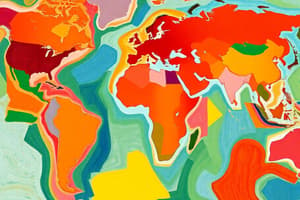Podcast
Questions and Answers
What does physical geography primarily focus on?
What does physical geography primarily focus on?
- Spatial data analysis using technology
- Natural features such as landforms and climate (correct)
- Cultural practices and beliefs
- Human activities and their impact on the environment
Which branch of geography examines human activities and their environmental impact?
Which branch of geography examines human activities and their environmental impact?
- Physical Geography
- Environmental Geography
- Geospatial Techniques
- Human Geography (correct)
Which of the following is a key concept that refers to an area's distinguishing characteristics?
Which of the following is a key concept that refers to an area's distinguishing characteristics?
- Region (correct)
- Location
- Movement
- Place
What is the primary purpose of thematic maps?
What is the primary purpose of thematic maps?
What do latitude and longitude represent in geographical terms?
What do latitude and longitude represent in geographical terms?
Which tool is primarily used for analyzing spatial data in urban planning?
Which tool is primarily used for analyzing spatial data in urban planning?
What aspect of geography does cultural geography specifically study?
What aspect of geography does cultural geography specifically study?
Which global issue is associated with changes in weather patterns and biodiversity loss?
Which global issue is associated with changes in weather patterns and biodiversity loss?
Flashcards are hidden until you start studying
Study Notes
Definition
- Geography is the study of the Earth's landscapes, environments, and the relationships between people and their environments.
Branches of Geography
-
Physical Geography
- Focuses on natural features: landforms, climate, soil, vegetation, and hydrology.
- Studies processes like erosion, weather patterns, and ecosystems.
-
Human Geography
- Examines human activities and their impact on the environment.
- Includes subfields like economic, cultural, urban, and political geography.
-
Geospatial Techniques
- Use of tools like GIS (Geographic Information Systems), GPS (Global Positioning System), and remote sensing.
- Analyzes spatial data to inform decision-making.
Key Concepts
- Location: Position on Earth's surface (absolute vs. relative).
- Place: Physical and human characteristics that define a location.
- Region: An area distinguished by specific characteristics (formal, functional, vernacular).
- Movement: How people, goods, and ideas are transported.
- Human-Environment Interaction: The ways people adapt to and modify their environment.
Maps
- Essential tools for representing geographical information.
- Types of maps:
- Topographic Maps: Show elevation and landforms.
- Thematic Maps: Highlight specific data (population, climate).
- Political Maps: Indicate governmental boundaries.
Important Terms
- Latitude and Longitude: Coordinates used to identify locations on Earth.
- Scale: Relationship between a distance on the map and the corresponding distance on the ground.
- Cartography: The science and art of map-making.
Environmental Geography
- Examines the interactions between people and the environment.
- Focuses on sustainability, resource management, and ecological conservation.
Cultural Geography
- Studies cultural practices, beliefs, and values across different regions.
- Analyzes the spatial distribution of languages, religions, and traditions.
Global Issues
- Climate Change: Impacts on weather patterns, sea level rise, and biodiversity.
- Urbanization: Growth of cities and associated challenges.
- Globalization: Increased interconnectedness and its effects on economies and cultures.
Important Tools
- GIS: Analyzes spatial data; used for urban planning, environmental monitoring.
- Remote Sensing: Collects data from satellites or aircraft; used for mapping and disaster management.
Careers in Geography
- Urban Planner
- Environmental Consultant
- Geospatial Analyst
- Geographic Educator
- Cartographer
Geography: The Study of Earth
- Geography explores the Earth's landscapes, environments, and how people interact with their surroundings.
- It encompasses two primary branches: Physical and Human Geography.
Physical Geography
- Focuses on Earth's natural features, including landforms, climate, soils, vegetation, and water.
- Examines natural processes such as erosion, weather patterns, and the intricate workings of ecosystems.
Human Geography
- Explores human activities and their impact on the environment.
- Includes specialized areas like economic geography (trade patterns), cultural geography (cultural landscapes), urban geography (city growth), and political geography (political boundaries).
Geospatial Techniques
- Utilizes advanced tools like GIS (Geographic Information Systems) to analyze spatial data from various sources.
- GPS (Global Positioning System) provides precise location data, and remote sensing uses satellites or aircraft to capture images and data.
Key Concepts in Geography
- Location: Defines a place's position on Earth using coordinates (absolute) or descriptions (relative).
- Place: Unique characteristics of a location, encompassing its natural and human features.
- Region: A defined area with specific characteristics (formal: based on official boundaries, functional: defined by interaction and connection, vernacular: based on common perceptions).
- Movement: The flow of people, goods, ideas, and information across space.
- Human-Environment Interaction: How humans adapt to and modify their environment.
Maps: Visualizing Geographic Information
- Maps are essential tools for visualizing geographic data.
- Topographic Maps: Show elevation and landforms using contour lines.
- Thematic Maps: Highlight specific data, such as population density or climate patterns.
- Political Maps: Outline governmental boundaries and administrative divisions.
Important Terminology
- Latitude and Longitude: Coordinates used to identify locations on Earth (latitude: north-south, longitude: east-west).
- Scale: The relationship between a distance on a map and the corresponding distance on the ground.
- Cartography: The science and art of map-making.
Environmental Geography: People and Nature
- Examines the complex interactions between humans and the environment.
- Focuses on issues related to sustainability, resource management, and ecological conservation.
Cultural Geography: Understanding Human Diversity
- Studies cultural practices, beliefs, and values across different regions.
- Analyzes the spatial distribution of languages, religions, and traditions.
Global Issues in Geography
- Climate Change: Impacts on weather patterns, sea level rise, and biodiversity.
- Urbanization: Growth of cities and the challenges associated with rapid urban development.
- Globalization: Increased interconnectedness across the world, affecting economies, cultures, and environments.
Important Tools for Geographic Study
- GIS: Powerful tool for analyzing spatial data; used for urban planning, environmental monitoring, and resource management.
- Remote Sensing: Collecting data from satellites or aircraft; used for mapping, disaster monitoring, and environmental assessment.
Careers in Geography
- Urban Planner: Helps design and develop sustainable and livable cities.
- Environmental Consultant: Provides expertise on environmental issues and sustainability.
- Geospatial Analyst: Analyzes spatial data for decision-making and policy development.
- Geographic Educator: Shares knowledge and passion for geography.
- Cartographer: Creates maps and other geographic visualizations.
Studying That Suits You
Use AI to generate personalized quizzes and flashcards to suit your learning preferences.




